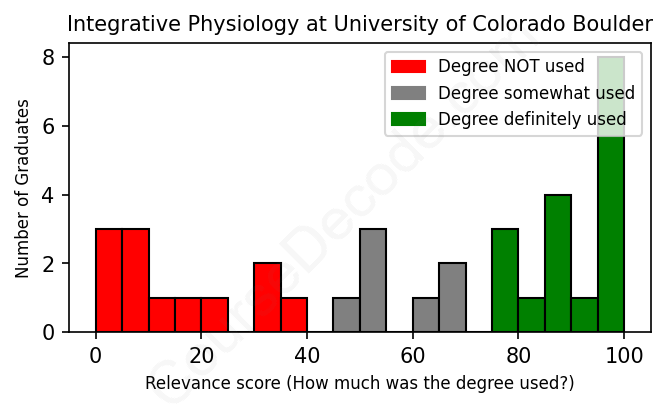
First, some facts. Of the Integrative Physiology graduates from University of Colorado Boulder we've analyzed , here's how many have used (or NOT used) their degree in their career:

These are estimates based on AI analysis of 36 LinkedIn profiles (see below).
The verdict? Below average. Overall, with an average relevance score of 58%, Integrative Physiology graduates from University of Colorado Boulder have a lower likelihood (-9%) of finding work in this field compared to the average graduate across all fields:
And for comparison, here's the chart for all profiles we've looked at across all degrees.
Also, after graduating, 52% of these graduates have pursued further education other than another Bachelor's degree (such as a Masters degree or other), compared to the average across all profiles of 35%. This suggests you may need more than just a Bachelors degree to be competitive as a Integrative Physiology graduate.
See the details:
|
Relevance score: 100% We think this person has gone into a career highly relevant to their degree. We think this person has gone into a career highly relevant to their degree.
DEGREE INFOGraduated in 2015 from University of Colorado Boulder with a Bachelor's degree in Integrative Physiology. No other secondary education since. JOB HISTORY SINCE GRADUATIONRegistered Nurse Swedish Medical Center Jun 2017 - Jul 2018 Registered Nurse  UCHealth Jul 2018 - Present ABOUTAfter 2 bachelor's degrees and 5+ years of experience as a Registered Nurse, I am ready to explore career paths outside of healthcare and apply my skills and knowledge to a new field.I love helping people and working with a team of knowledgeable and motivated individuals. I thrive in a fast-paced environment and am quick on my feet. Nothing excites me more than starting each day not knowing what to expect. I love the opportunity to learn something new every day. Although my career has always been in healthcare, I have many skills that are applicable to opportunities outside of nursing: communication, teamwork, critical thinking, time-management, conflict resolution, adaptability, professionalism, delegation, and strong work ethic - just to name a few.I am excited to step outside of my comfort zone and pursue a career with opportunity for growth. Please feel free to reach out! |
The top 10 most common jobs done by the graduates we've analyzed (ranked most common to least) are:
After reviewing a bunch of LinkedIn profiles from folks who graduated with a degree in Integrative Physiology from the University of Colorado Boulder, it's pretty clear that most of them have ventured into several different career paths. A significant portion of these graduates works in healthcare roles, specifically as Physical Therapists, Physician Assistants, or within emergency medical services like EMTs. These jobs are heavily tied to the skills and knowledge gained during their studies, like understanding human anatomy, movement, and patient care—which makes them highly relevant. It’s also worth mentioning that many of them have taken on clinical research roles, where their background in physiology serves them well in designing and assessing research studies.
On the flip side, there are quite a few graduates who have moved into fields that seem pretty disconnected from their degree. You see roles like IT Support Specialists, Graphic Designers, and even Marketing Coordinators. While these jobs may help develop transferable skills such as communication and problem-solving, they don’t really utilize the knowledge that comes with studying Integrative Physiology. Overall, it looks like those who stuck with health-related careers found their degree very applicable, while others ended up in jobs where their studies didn’t play a major role. So, if you’re studying Integrative Physiology, aiming for a career in healthcare seems like a smart move if you want to directly use what you've learned!
Here is a visual representation of the most common words in job titles for Integrative Physiology graduates (this is across all Integrative Physiology graduates we've analyzed, not just those who went to University of Colorado Boulder):

Graduates from the Integrative Physiology program at the University of Colorado Boulder tend to follow a variety of career paths after finishing their degree. For many, the first job often aligns with health and medical fields, with positions like physical therapists, physician assistants, and paramedics being commonly reported. It seems like those who graduated around 2011 quickly ventured into roles directly related to health care, such as physical therapy or advanced practice roles in medicine. This pattern continues for several years, with many individuals settling into stable careers in hospitals, clinics, and private practices, showing a strong connection to their degree and the skills they acquired during their studies.
However, it's a mixed bag as time goes on. While numerous graduates remain well-established in health-related professions, such as physical therapists and physician assistants, some have shifted to seemingly unrelated fields like IT, education, and even finance. For instance, graduates from later years have taken on roles as IT support specialists and project managers, which don't seem directly connected to their education. Overall, it’s fair to say that while many find fulfilling careers related to their Integrative Physiology training, there are also a notable number who veer into other job markets, suggesting a blending of skills across disciplines. So, if you're considering this major, it's promising in healthcare, but your path can certainly branch out into different fields if that interests you!
Honestly, a Bachelor's degree in Integrative Physiology can be pretty challenging, particularly at a school like the University of Colorado Boulder, which has a strong reputation for its science programs. You'll dive into some pretty complex topics like human anatomy, physiology, and biochemistry, which means you need to be ready to put in the study hours. If you’re someone who's passionate about how the body works and you enjoy science, you might find it rewarding, but the coursework can definitely be rigorous. It's about average in terms of difficulty, but that really depends on your strengths and interests. Just be prepared to stay organized and keep up with assignments and exams if you decide to go for it!
Most commonly, in the LinkedIn profiles we've looked at, it takes people 4 years to finish a Bachelor degree in Integrative Physiology.
So, looking at these Integrative Physiology grads from CU Boulder, it's a mixed bag when it comes to money. A few folks in healthcare, like physical therapists and physician assistants, seem to be doing pretty well because those jobs tend to pay decently—especially once they get some experience under their belts. Others have taken some varied paths: one grad bounced around as a lead optician and then dabbled in IT, while another has been in a bunch of teaching and research roles which can be hit or miss in terms of salary. Overall, it seems like some are definitely making good money while others are still finding their footing or choosing roles that might not pay as well, especially early on. So, it’s a bit of a gamble, but a lot of potential for growth!
Here is a visual representation of the most common words seen in the "about" section of LinkedIn profiles who have a Bachelor degree in Integrative Physiology (this is across all Integrative Physiology graduates we've analyzed, not just those who went to University of Colorado Boulder). This may or may not be useful:

Here are all colleges offering a Bachelor degree in Integrative Physiology (ordered by the average relevance score of their Integrative Physiology graduates, best to worst) where we have analyzed at least 10 of their graduates:
| College | Score | Count |
|---|---|---|
 University of Colorado Boulder University of Colorado Boulder
|
58 | 36 |